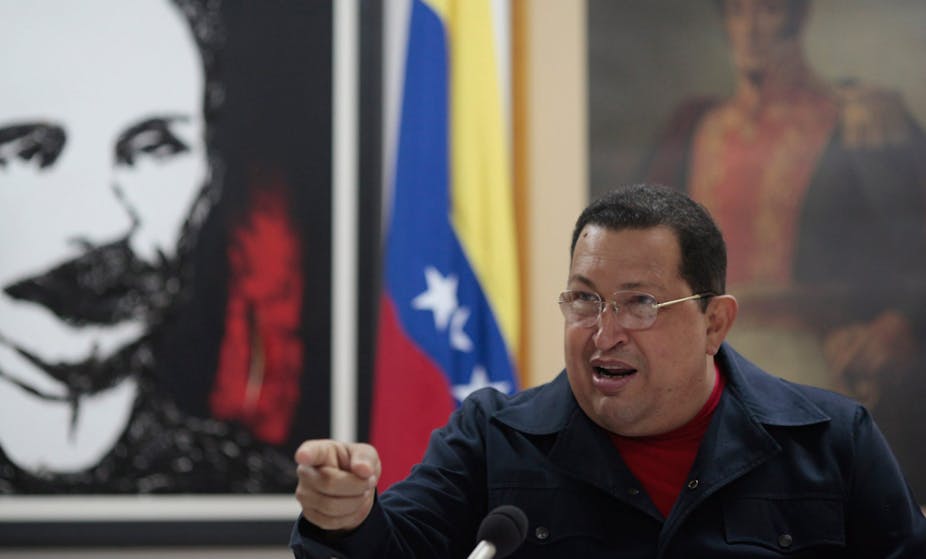Just eight months after being treated in Cuba for cancer, Venezuelan President Hugo Chávez was back in Cuba again last month to have another tumor removed from the same area.
Despite his illness, Chávez promises that he will be fighting fit to take on opposition candidate Henrique Capriles Radonski in this October’s presidential election.
But while Chávez and his supporters should certainly be worried about his physical health, it is his political well-being that is most under threat.
Hidden illness
Details on the exact nature and location of the tumor remain thin. When his cancer first appeared last June it was kept secret for days and only reluctantly released when rumours suggested that he might have died. Once past the shock of hearing that Chávez was battling cancer, Venezuelans asked who was running the country while the president was secretly convalescing in Cuba.
Chávez perpetuated the confusion by insisting that there was no need to even consider succession processes because he was continuing to govern from Havana. Little has changed with this latest bout of presidential medical tourism.
No succession plan
Power in Venezuela is tightly concentrated in Chávez’s hands. His propensity for unexpected announcements and sudden reversals means that little happens without his direct say so. This has allowed him to claim full credit for many of the admirable social advances that he has brought to his country’s legions of poor. It also means that the entire Bolivarian project is dependent upon his leadership.
By framing his regime around what is essentially a cult of personality, Chávez has deliberately avoided giving any indication of who his heir might be and has prevented the rise of any contenders for the title. Worse, the centralisation of nearly all authority in the presidency has allowed corruption to flourish and the creation of bureaucratic fiefdoms dedicated to using governmental institutions and programs for personal advancement.
Venezuelans are thus understandably asking what will happen if they re-elect Chávez and he succumbs to cancer. Will innovative social and development programs be maintained? Tentative answers are worrying.
The accusations of corruption and abuse of power swirling around Chávez officials suggest that even his most intimate insiders may be ambivalent about his socialist agenda. Scandals involving government officials and military officers have even spread into Chávez’s own family. His daughter, Rosinés recently sparked outrage by posting an Instagram photo of herself with a fan of US bank notes that most Venezuelans cannot access because of government-imposed currency restrictions.

Viable opposition
Just a year ago none of this would have mattered much because there was no remotely viable opposition candidate. This changed on February 12th when the opposition united behind the moderate governor of Miranda state, Henrique Capriles, nominating him in Venezuela’s first ever nation-wide presidential primary.
While Chávez has never been short of opposition, it has always been reactionary in nature and disorganised. Capriles brings a major shift. Rather than promising a return to the oligarchical past, Capriles has publicly recognized Chávez accomplishments and promised to continue and in some cases extend them. More to the point, Capriles record in Miranda makes his promises credible.
This is a serious threat for Chávez. It deprives him of his standing electoral tactic of claiming only he cares for the poor. Matters are further complicated by the very success of Chávez’s capacity and self-confidence building social programs.
Although residents of Caracas shanty towns were asking questions about issues such as corruption and rising violence, they had no viable political alternative to Chávez. Capriles offers such an alternative with the added bonus of clarity of who would succeed him should he be unable to complete his term in office.
Political challenge
In short, Capriles is offering something that Chávez is not: a social development-oriented platform that is embedded in a party political structure that extends beyond the identity of the leader.
The irony is that it is Chávez who has sown the seeds of the political cancer afflicting his presidential campaign. Chavista social programs gave many Venezuelans the confidence to ask questions linking the future of the Bolivarian project to the post-Chávez succession scenario.
This also highlights the ultimate test of Chávez’s transformative project, namely the willingness of the majority of citizens to actively question their political leadership and take charge of their own destiny by using the political system rather than relying on the charisma of a single individual.
Although Chávez’s personal and political health is questionable, it is still possible that his sacrifices and the policy treatment he has given Venezuela will ultimately have meaningfully advanced the well being of his country. A key diagnostic will be the election this October.

